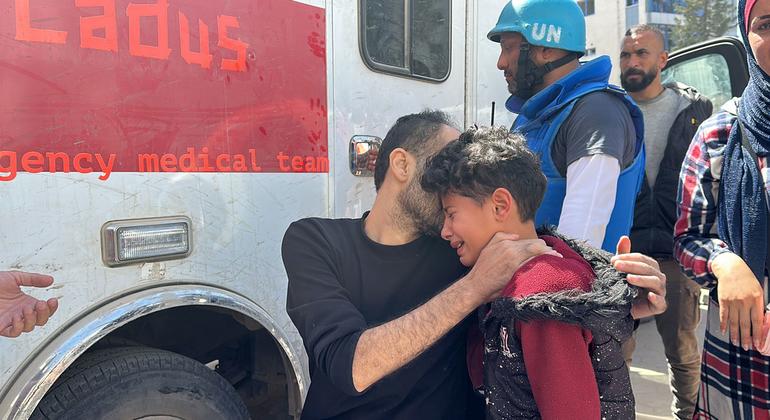The Secretary-General of the United Nations issued a statement condemning any act of retaliation and calling on the international community to work together to prevent further developments that could have devastating consequences for the region and beyond. This comes after more than six months of conflict in Gaza that have raised fears of a wider regional conflict. The Director-General of the International Atomic Energy Agency (IAEA) confirmed that there was no damage to Iran’s nuclear sites and called for extreme restraint from all sides, emphasizing that nuclear facilities should never be targeted in military conflicts.
The UN human rights office in Geneva also urged all parties to de-escalate the situation rapidly and called on third states to use their influence to prevent further deterioration in the already precarious situation. In Gaza, aid teams reported on the dangers faced by Palestinian civilians, particularly pregnant women and breastfeeding mothers, as a result of the destruction of vital medical equipment and widespread dehydration, malnutrition, and fear among the population. The UNFPA representative for Palestine highlighted the increase in complicated births due to malnutrition, dehydration, and fear, with some doctors reporting a doubling of emergency obstetric cases compared to before the war.
The UNFPA official described his mission to assess the impact of Israeli attacks on healthcare in Gaza, noting that the remaining hospitals in the enclave were struggling to provide care while being targeted themselves. He expressed heartbreak over the purposeful destruction of medical equipment, including ultrasounds essential for safe births. The situation in Gaza remains dire, with healthcare facilities under immense strain and pregnant women facing increased risks due to the conflict. The international community must act to ensure the protection of civilians and the provision of essential services in the region.
The ongoing conflict in Gaza has raised concerns about the potential for further escalation and regional instability. The international community must work together to prevent any actions that could lead to devastating consequences for the entire region. The IAEA has confirmed the safety of Iran’s nuclear sites and called for extreme restraint from all sides to avoid targeting nuclear facilities in military conflicts. The UN human rights office has urged all parties to de-escalate the situation and called on influential third states to use their power to prevent further deterioration in the already fragile situation in Gaza.
The aid teams in Gaza have highlighted the severe challenges faced by Palestinian civilians, particularly pregnant women and breastfeeding mothers, as a result of the destruction and fear caused by the conflict. The increase in complicated births and emergency obstetric cases due to malnutrition, dehydration, and fear underscores the urgent need for humanitarian assistance in the region. The international community must prioritize the protection of civilians and the provision of essential services to prevent further suffering and loss of life in Gaza.









